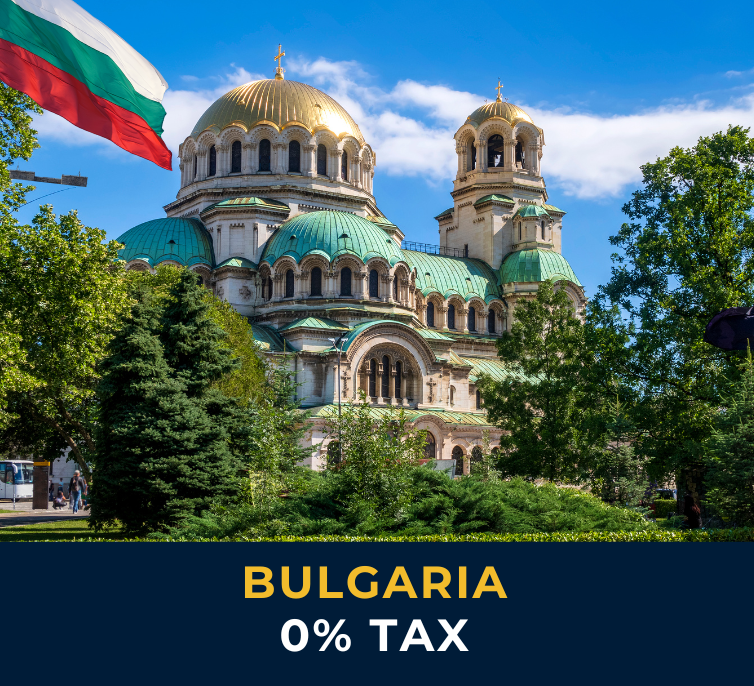Bulgaria, an undiscovered destination, combines its rich cultural heritage—shaped by Slavic, Hellenic, and Turkish influences—with stunning landscapes, ranging from golden beaches on the Black Sea to the majestic Balkan Mountains. Its vibrant cuisine, ancient traditions, and cities like Plovdiv, one of the oldest in Europe, make this country as unique as it is irresistible.
However, today we will focus on another equally fascinating aspect: Bulgaria’s attractive tax system, which offers highly favorable conditions for both individuals and businesses.
This system has attracted numerous tax nomads, many of whom have settled in the city of Bansko, known for its affordable rentals and stunning ski slopes.
Let’s explore the highlights of this iconic country, starting with tax residency.
Tax Residency in Bulgaria
For an individual to be considered a tax resident in Bulgaria, they must meet one of the following criteria:
- Reside in Bulgaria for more than 183 days within a 12-month period.
- Have a permanent address in Bulgaria, as long as their center of vital interests is also in the country.
- Have their center of vital interests in Bulgaria.
More and more tax nomads are looking for countries with low taxes that also offer flexibility by not requiring long stays throughout the year. This balance has driven the popularity of destinations like Paraguay or Cyprus.
In this context, Bulgaria presents itself as an interesting option, as it can issue a tax residency certificate without the need to reside for more than 183 days in the country.
However, in practice, the process is not as simple as some promoters of this residency claim. During the first year, it is highly recommended to stay more than 183 days in Bulgaria, as you will need to demonstrate that your “center of vital interests” is there. This is evaluated through a questionnaire considering factors such as friendships, investments, sources of income, and housing—something difficult to prove without having developed strong ties in the country.
In the following years, once you are well settled and with proper planning, maintaining tax residency will be much easier without needing to spend more than half a year in Bulgaria.
Income Tax in Bulgaria: 7.5% and 10%
One of Bulgaria’s most notable advantages is its low flat income tax rate for individuals, which stands at 10% for all income levels. This makes the country particularly attractive for digital nomads and freelancers.
In particular, Bulgaria has gained popularity among digital nomads due to the possibility of achieving an effective income tax rate of 7.5% if operating as a freelancer. This is possible because a fixed 25% deduction for operational expenses is allowed without the need for justification.
An important consideration is that, as a freelancer in Bulgaria, you must contribute 27.8% of your income to social security. However, this percentage is applied to a maximum base of €1,900 per month, meaning social security contributions will not exceed €530 per month.
Another relevant aspect is the taxation of capital gains. These are subject to a standard rate of 10%; however, gains from the sale of shares listed on the Bulgarian and EU/EEA stock exchanges are completely exempt from taxes.
Regarding dividends, they are taxed at a reduced rate of 5%, and interest from bank deposits within the EU/EEA is not subject to taxation.
Additionally, Bulgaria only applies the exit tax at the corporate level.
Finally, a curious feature of the Bulgarian tax system, compared to countries like Spain, is that income tax returns are always filed individually, as joint taxation is not an option.
Companies in Bulgaria: 10% Taxes
Bulgaria offers one of the lowest corporate tax rates in the European Union, with a fixed rate of 10%. This makes the country particularly attractive for small and medium-sized enterprises (SMEs) as well as multinational corporations.
Bulgaria’s companies present several advantages. For example, liability is limited to the contributed capital, and while there is a mandatory public registry for directors and shareholders, no minimum capital is required for the company’s formation.
The only drawback for companies in Bulgaria is that, although dividends distributed to companies within the EU are exempt from taxes, Bulgaria may not be the ideal holding company location in Europe, as distributions to individuals are subject to a 5% withholding tax.

Advantages and Disadvantages of Tax Residency in Bulgaria
Advantages of Residency in Bulgaria:
- Attractive tax system: As mentioned earlier, the 10% flat income tax and the 7.5% effective tax rate for freelancers are some of the most attractive aspects of the country.
- Affordable cost of living and hiring: Living in Bulgaria is significantly cheaper than in most European countries. Additionally, for those looking to hire talent, labor costs in Bulgaria are highly affordable.
- EU membership: Bulgaria is part of the EU, making it an attractive destination for European passport holders and a great opportunity for doing business in Europe.
- High level of security: Bulgaria stands out for its low crime rate, making it a safe place to live.
- Expat community: Bulgaria is slowly gaining a reputation as a business-friendly environment, especially in areas like Bansko, where many entrepreneurs are establishing themselves.
Disadvantages of Residency in Bulgaria:
- Lack of infrastructure and innovation: Although it has improved in recent years, some areas still suffer from inadequate roads, medical services, and public transportation.
- Language barrier: Bulgarian can be difficult to learn for those with no experience in Slavic languages, and English is not widely spoken outside major cities.
- Limited services: In rural or more remote areas, access to services like high-quality healthcare or international education may be limited.
- Cold winter climate: The winter climate, particularly in the north and mountainous regions, can drop below -5°C, which may be a disadvantage for those who don’t tolerate cold weather. However, it can be an advantage for skiing enthusiasts, as the country boasts numerous ski resorts.

Bulgaria Conclusion
From a fiscal perspective, Bulgaria should be a model for other European Union countries. It not only stands out for its low taxes but also for the clarity and consistency of its tax system. These advantages, along with its low cost of living, make Bulgaria one of the best options for tax residency, especially for digital nomads who seek to optimize their resources and enjoy greater flexibility in their future residency.
However, Bulgaria may not be the best choice for business owners looking for international expansion that requires advanced infrastructure, a more developed business environment, or a robust talent and networking ecosystem. Still in a growth phase, the country does not yet attract the same level of capital and investment as destinations like the United Arab Emirates, Singapore, or Hong Kong.
Are you interested in obtaining tax residency or starting a business in Bulgaria?
Or would you prefer a complete analysis of your situation to discover the best option for you?
In either case, we can help!
Simply request your FREE INITIAL CONSULTATION BY CLICKING HERE, or contact us directly via WhatsApp or through the form below.
Contact us
Digital nomads in Bulgaria pay a flat 10% income tax rate, with the possibility of reducing it to 7.5% if working as a freelancer, thanks to a 25% operational expense deduction.
You can obtain tax residency in Bulgaria by living there for more than 183 days in a year or having a permanent address in the country and having your center of vital interests in Bulgaria.
Yes, due to its low tax rate (10% on income), affordable cost of living, and flexibility in obtaining tax residency, Bulgaria is an excellent option for digital nomads.
Companies in Bulgaria pay a 10% corporate tax rate, one of the lowest in the EU. Additionally, dividends distributed within the EU are tax-exempt.

